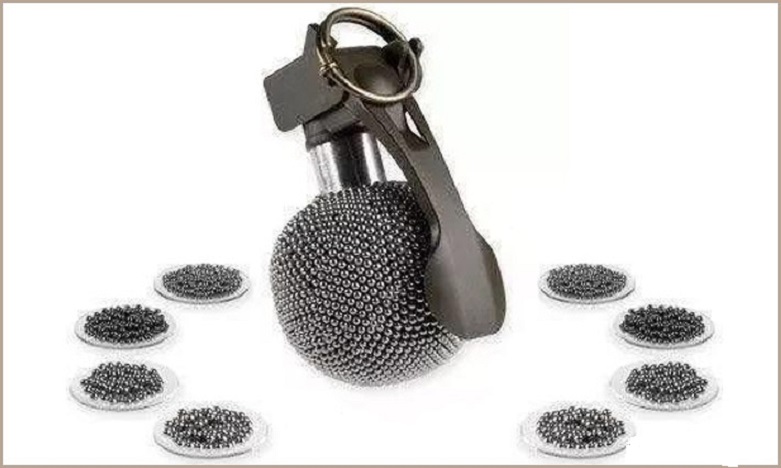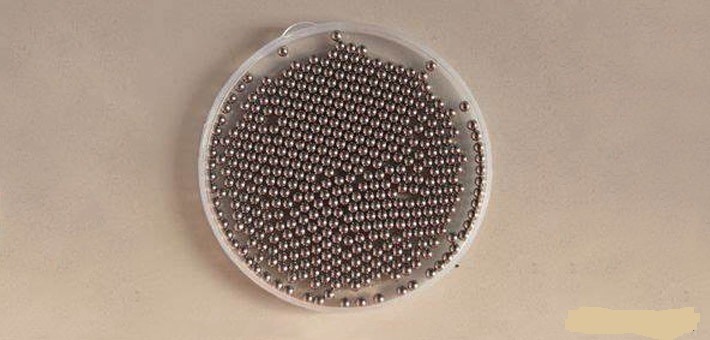Tungsten Alloy Spherical Fragments

Tungsten Alloy Spherical Fragments
Tungsten alloy spherical fragments are composed of high-performance explosives, a lot of tungsten alloy balls, and a metal shell. They mainly rely on the kinetic energy of the fragments to damage targets. They have gradually become the preferred damage element for air defense, surface killing, and other types of killing warheads.

Tungsten Alloy Spherical Fragments
Tungsten alloy endows the spherical fragments with excellent characteristics, such as high density, high hardness, wear resistance, no large energy loss while maintaining speed, strong armor penetration, and lethality.
Working Principle of Tungsten Alloy Spherical Fragments
The explosion of the explosive produces a detonation wave and a large amount of high-temperature, high-pressure detonation gas impacts the shell, causing it to undergo huge deformation and even fragmentation.
After the shell is broken, scattered tungsten alloy bead fragments are formed, and the detonation products formed by the explosive explosion will escape and quickly surround the fragments formed by the broken shell.
Fragments will be accelerated under the action of detonation waves and high-temperature, high-pressure gas until the gas expansion speed is lower than the fragmentation speed.
Since the detonation wave decays much faster than the fragment velocity, after a short time, the fragments will fly out of the detonation product.
More about Tungsten Alloy Spherical Fragments
Normally, the lethality of tungsten alloy spherical fragments is measured by the kinetic energy of the target or the ability to transmit in the target. Therefore, the process of fragments killing a target is a process of energy release and transfer, that is, the extent of damage to the target by fragments depends on how much energy is transferred. Within a certain diameter range, the smaller the fragment, the higher the efficiency of energy transfer.
The ballistic limit penetration ability of fragments is often characterized by the ballistic limit penetration thickness of the fragments on the steel target plate. According to literature records, researchers have conducted relevant experiments on the end-point ballistic performance of tungsten alloy spherical fragments.
They studied the speed decay law of spherical tungsten alloy fragments, the deformation, and fragmentation driven by detonation, the penetration of semi-infinite steel targets, and the penetration of thin steel targets. The research results show that the attenuation coefficient of tungsten alloy spherical fragments during long-distance flight is constant, and the drag coefficient has a linear relationship with the initial velocity of the fragments.
Driven by detonation, the fragmentation rate of spherical tungsten alloy fragments with a smaller diameter is very low, while the fragmentation rate of larger diameter fragments is nearly 50%, that is, the diameter of the tungsten alloy ball directly affects the fragmentation rate.
After the tungsten alloy ball was driven by the detonation, a slight mass loss and deformation occurred, and the preservation speed and armor penetration ability were reduced, but it still had a strong armor penetration ability after a long-distance flight. Within a certain speed range, the ultimate armor penetration ability of spherical tungsten alloy fragments and the armor penetration speed basically increase linearly.
Conclusion
Thank you for reading our article and we hope it can help you have a better understanding of the tungsten alloy spherical fragments. If you want to learn more about tungsten alloy or other types of refractory metals and alloys, we would like to advise you to visit Advanced Refractory Metals (ARM) for more information.
Headquartered in Lake Forest, California, USA, Advanced Refractory Metals (ARM) is a leading manufacturer & supplier of refractory metals & alloys across the world. It provides customers with high-quality refractory metals & alloys such as niobium, molybdenum, tantalum, rhenium, tungsten, titanium, and zirconium at a very competitive price.
{{item.content}}
LEVE A REPLY
{{item.children[0].content}}
{{item.content}}






